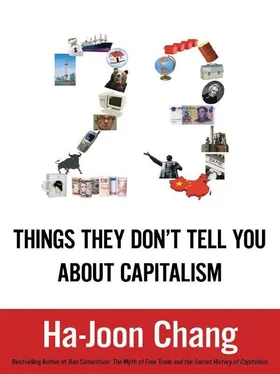More importantly, in a world populated by selfish individuals, the invisible reward/sanction mechanism cannot exist. The problem is that rewarding and punishing others for their behaviours costs time and energy only to the individuals taking the action, while their benefits from improved behavioural standards accrue to everyone. Going back to our examples above, if you, as a taxi driver, want to chase and beat up a runaway customer, you may have to risk getting fined for illegal parking or even having your taxi broken into. But what is the chance of you benefiting from an improved standard of behaviour by that passenger, who you may not meet ever again? It would cost you time and energy to spread the good word about that Turkish garage, but why should you do that if you will probably never visit that part of the world ever again? So, as a self-seeking individual, you wait for someone foolish enough to spend his time and energy in administering private justice to wayward taxi passengers or honest out-of-the-way garages, rather than paying the costs yourself. However, if everyone were a self-interested individual like you, everyone would do as you do. As a result, no one would reward and punish others for their good or bad behaviour. In other words, those invisible reward/sanction mechanisms that free-market economists say create the optical illusion of morality can exist only because we are not the selfish, amoral agents that those economists say we are.
Morality is not an optical illusion. When people act in a non-selfish way – be it not cheating their customers, working hard despite no one watching them, or resisting bribes as an underpaid public official – many, if not all, of them do so because they genuinely believe that that is the right thing to do. Invisible rewards and sanctions mechanisms do matter, but they cannot explain all – or, in my view, even the majority of – non-selfish behaviours, if only for the simple reason that they would not exist if we were entirely selfish. Contrary to Mrs Thatcher’s assertion that ‘there is no such thing as society. There are individual men and women, and there are families’, human beings have never existed as atomistic selfish agents unbound by any society. We are born into societies with certain moral codes and are socialized into ‘internalizing’ those moral codes.
Of course, all this is not to deny that self-seeking is one of the most important human motivations. However, if everyone were really only out to advance his own interest, the world would have already ground to a halt, as there would be so much cheating in trading and slacking in production. More importantly, if we design our economic system based on such an assumption, the result is likely to be lower, rather than higher, efficiency. If we did that, people would feel that they are not trusted as moral agents and refuse to act in moral ways, making it necessary for us to spend a huge amount of resources monitoring, judging and punishing people. If we assume the worst about people, we will get the worst out of them.
Thing 6: Greater macroeconomic stability has not made the world economy more stable
Until the 1970s, inflation was the economy’s public enemy number one. Many countries suffered from disastrous hyperinflation experiences. Even when it did not reach a hyperinflationary magnitude, the economic instability that comes from high and fluctuating inflation discouraged investment and thus growth. Fortunately, the dragon of inflation has been slain since the 1990s, thanks to much tougher attitudes towards government budget deficits and the increasing introduction of politically independent central banks that are free to focus single-mindedly on inflation control. Given that economic stability is necessary for long-term investment and thus growth, the taming of the beast called inflation has laid the basis for greater long-term prosperity.
Inflation may have been tamed, but the world economy has become considerably shakier. The enthusiastic proclamations of our success in controlling price volatility during the last three decades have ignored the extraordinary instability shown by economies around the world during that time. There have been a huge number of financial crises, including the 2008 global financial crisis, destroying the lives of many through personal indebtedness, bankruptcy and unemployment. An excessive focus on inflation has distracted our attention away from issues of full employment and economic growth. Employment has been made more unstable in the name of ‘labour market flexibility’, destabilizing many people’s lives. Despite the assertion that price stability is the precondition of growth, the policies that were intended to bring lower inflation have produced only anaemic growth since the 1990s, when inflation is supposed to have finally been tamed.
That’s where the money is – or is it?
In January 1923, French and Belgian troops occupied the Ruhr region of Germany, known for its coal and steel. This was because, during 1922, the Germans seriously fell behind the reparation payments demanded of them by the Versailles Treaty, which had concluded the First World War.
Had they wanted money, however, the French and the Belgians should have occupied the banks – after all, ‘that’s where the money is’, as the famous American bank robber Willie Sutton allegedly said, when asked why he robbed banks – rather than a bunch of coal mines and steel mills. Why didn’t they do that? It was because they were worried about German inflation.
Since the summer of 1922, inflation in Germany had been getting out of control. The cost of living index rose by sixteen times in six months in the second half of 1922. Of course, the hyperinflation was at least in part caused by the onerous reparation demands by the French and the Belgians, but once it started, it was entirely rational for the French and the Belgians to occupy the Ruhr in order to make sure that they were paid their war reparations in goods, such as coal and steel, rather than in worthless paper, whose value would diminish rapidly.
They were right to do so. German inflation got completely out of control after the occupation of the Ruhr, with prices rising by another 10 billion times (yes, billion, not thousand or even million) until November 1923, when Rentenmark, the new currency, was introduced.
The German hyperinflation has left big and long-lasting marks on the evolution of German, and world, history. Some claim, with justification, that the experience of hyperinflation laid the grounds for the rise of the Nazis by discrediting the liberal institutions of the Weimar Republic. Those who take this view are then implicitly saying that the 1920s German hyperinflation was one of the main causes of the Second World War. The German trauma from the hyperinflation was such that the Bundesbank, the West German central bank after the Second World War, was famous for its excessive aversion to loose monetary policy. Even after the birth of the European single currency, the euro, and the consequent de facto abolition of national central banks in the Eurozone countries, Germany’s influence has made the European Central Bank (ECB) stick to tight monetary policy even in the face of persistently high unemployment, until the 2008 world financial crisis forced it to join other central banks around the world in an unprecedented relaxation of monetary policy. Thus, when talking about the consequences of the German hyperinflation, we are talking about a shockwave lasting nearly a century after the event and affecting not just German, but other European, and world, histories.
Читать дальше






![Ally Carter - [Gallagher Girls 01] I'd Tell You I Love You But Then I'd Have to Kill You](/books/262179/ally-carter-gallagher-girls-01-i-d-tell-you-i-lo-thumb.webp)





